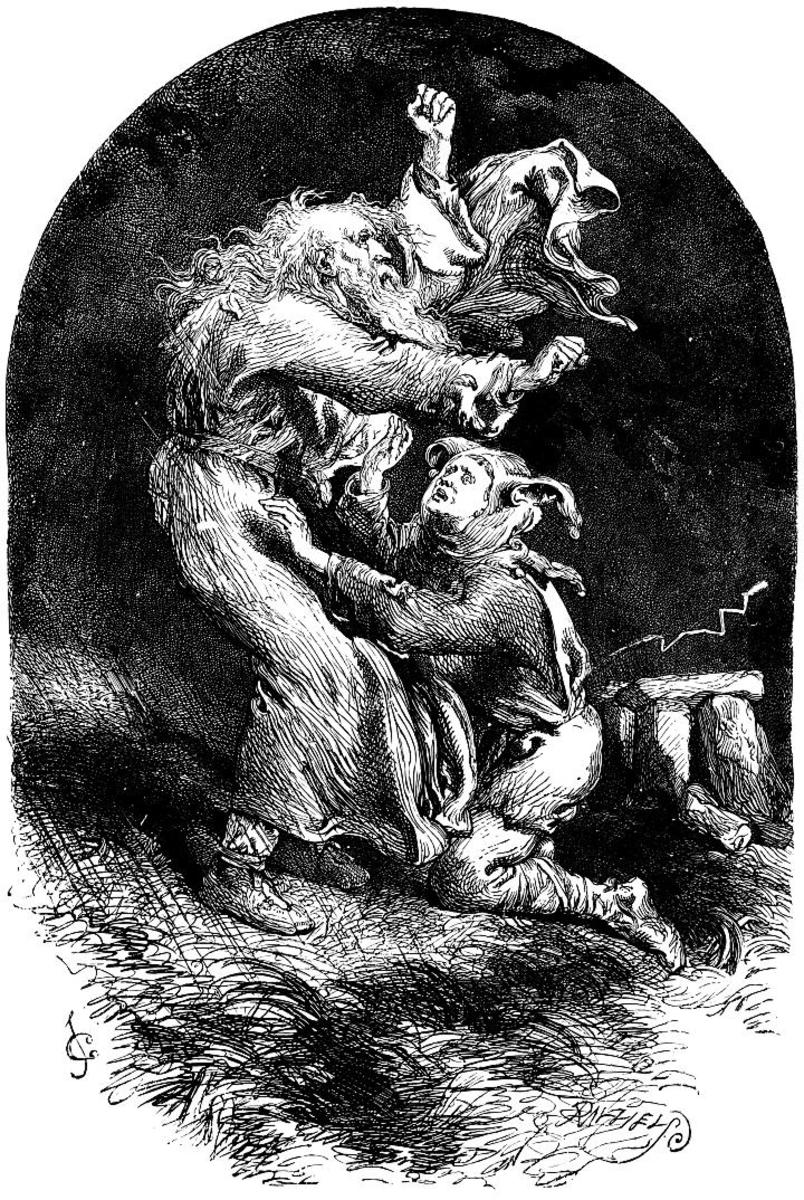Examining Mental Health Through Literature
Diagnosing Lear

In a psychological sense, William Shakespeare's King Lear provides basic examples of characters that demonstrate bizarre behavior. More specifically, King Lear, himself, is an example of someone who strays away from being a happy powerful leader to a borderline psychotic man who has lost all control of himself.
In the end, Lear loses everything because his thought process is horribly wrong. Instead of trying to gain knowledge as to why his daughters have treated him so poorly, he simply internalizes everything that has happened to him.
As a result of his thinking process, Lear becomes marginalized from those who used to respect him and begins a swift decent into madness. In the process of losing everything, however, Lear is able to come to terms with his moral flaws and gains a better understanding of who he is.
Unfortunately, he must lose everything for this to happen. In modern medical terminology, Lear show symptoms of bipolar disorder with episodes of psychotic behavior.
Quick Points of Bipolar Disorder
Manic Phase of Bipolar
| Depressive Phase of Bipolar
| Resoution
|
|---|---|---|
Believes (s)he is famous
| Believes (s)he is ruined
| Plenty of sleep
|
Believes (s)he has a lot of money
| Believes (s)he is penniless
| Nutritious Diet
|
Believes (s)he has special powers
| Believes (s)he has committed a crime
| Exercise/Therapy
|
Information provided by: http://www.nimh.nih.gov/index.shtml
Emotional Tug-of-War

Lear is a man who once had the power to influence people. After giving his daughters Regan and Goneril much of his wealth and property, he is immediately betrayed by them.
Initially, is Regan and Goneril who provide the King with empty affection. In scene one, Lear is attempting to elicit affection from his daughters due to his pride and his daughters' desire for wealth and status.
Before he divides his estate between his daughters, he asks, "Which of you shall we doth love me the most" (1.45). By doing this, it appears that Lear can only show his love through material wealth. This is troubling foreshadowing by Shakespeare that reveals that Lear may not know how to love at all. Soon after, Goneril and Regan are showering Lear with glowing language, something Lear's youngest daughter has an ability to see right through.
When asked by Lear if his precocious daughter Cordelia has anything to say to inflate his ego, Cordelia sarcastically declines by saying, "I am sure my love's more richer than my tongue" (1.71-72). Soon after, Lear makes an impulsive decision to immediately disown her.
Lear is only asking, on the surface, for expressions of love. Unfortunately, money is the only way he can achieve this.
Poll
Have you or a loved one been effected by Manic Depression?
It is debatable that Lear's mental instability was dormant when he was able to control and influence his daughters. Regardless, what Lear perceives as insubordination regarding Cordelia is the initial trigger that sparks his eroding mental health.
He cannot fully comprehend that Cordelia will not give him glowing praise, when Goneril and Regan initially seem so eager to please. Lear initially is irritated with Cordelia and uses financial language to try to persuade Cordelia into making him feel better about himself: "Go to, go to, mend your speech a little lest it may mend your fortunes" (1 85-86).
By saying this, it appears once again that the only way Lear can show affection is through financial means.
As the play progresses however, his financial wealth is the cause of his demise. His attempt to win the hearts of his daughters with money, who in turn betray him, is the reason his sanity deteriorates.

Other Components of Manic Depression
-Impulsive Behavior
-Spending Sprees
-Lowered Sexual Inhibitions
-Alcohol/Drug Abuse
Textual Illustration
According to Nacny J.C. Andreasen's article, "The Artist of Scientist", "Lear is made to recover sanity through insanity" (Andreasen 4). Only through disorganized thoughts and actions can Lear gain a better understanding of himself.
The beginning of the play shows that Lear has two major character defects that his nervous breakdown allows him to come to terms with: "Vindictive unforgivingness" and "Pride" (Andreasen 4). He is so used to being in control that the thought of someone who may have opposing views infuriates him.
At the end of the play, his unforgiving nature is replaced with "compassion" (Andreasen 4), and his pride is replaced with "humility" (Andreasen 4.)
Good Read

Getting a Sense of Who Lear is
Although western medicine was quite primitive during the time of the Renaissance, Lear's behavior demonstrates someone who shows symptoms of bipolar disorder or what is called "manic depression".
In the beginning of the play, Lear demonstrates behavior that could be classified as mania- the one side of this mental illness.
According to the National Institute of Mental Health, when one is experiencing mania, the person may believe that "he or she is famous, has a lot of money, or has special powers" (NIMH 3). Conversely, when someone is in the depressive phase of bipolar disorder, he or she may believe that they are "ruined and penniless or has committed a crime" (NIMH 3).
The depressive aspect of this disease is present when Lear is wandering aimlessly outside in a storm. The text reveals that Lear is in the depressive phase of his illness as he cries: "Here I stand your slave, a poor, infirm, weak and despised old man" (9 19-20). The difference between Lear compared to a typical person with bipolar is that he did have money and was famous, but later in the play, he becomes mad and penniless; this was not a delusion.
However, during the manic cycle of bipolar, one may take part in "spending sprees" or make "impulsive business investments" (NIMH 1). This may explain why he inexplicably gave away his wealth before carefully considering the consequences. His restless irritability towards those he encounters as well as his "poor judgment" (Andreasen 4) when dealing with others, should be cause for concern and certainly falls under the category of someone who is bipolar.
Cure for Pain
What ultimately cures Lear of his mental instability is the existential journey he travels on. Similar to Prince Hal's father in King Henry IV, Lear shows no interest in understanding how the typical English citizen lived and worked.
By losing everything, Lear slowly gains a better understanding of how to treat people. Lear's situation is also similar to the story of Job in the Old Testament of the Bible.
In the book of Job, the protagonist loses everything he owns before he is allowed to come to terms with his relationship with God and becomes a better person. In Lear's case, his mental illness is simply cured with extended sleep after he makes his transformation from a tyrant leader to a humble, self-realzied human being.
Works Cited
Shakespeare, William. King Lear. Stanley Wells. Oxford World's Classic. Oxford: Oxford UP, 2008.
Andreasen, Nancy J.C. "The Artist and Scientist" Shakespearean Criticism. ED. Dana Ramel Barnes. Vol. 35. Detroit: Gale, 1997 Literature Resource Center. Web. 9 Nov. 2010.
National Institute of Mental Health. "Bipolar Disorder" Press and Dissemination Branch. 2008. Web. 25. October 2010.








